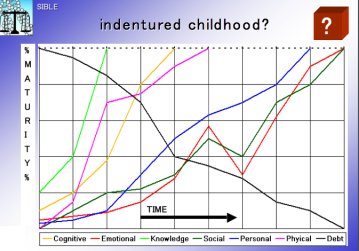Transhuman Parenthood
Sebastian Sethe
page 4 of 4
Biological parenthood would still be accounted for, but it would be one role among many in this spectrum of parental responsibilities. ![]() Degrees of personhood can be legally reflected in degrees of parenthood. This flexible model provides a more useful and reasonable tool for arbitrating rights and responsibilities in relation to posthuman beings.
Degrees of personhood can be legally reflected in degrees of parenthood. This flexible model provides a more useful and reasonable tool for arbitrating rights and responsibilities in relation to posthuman beings.
This is another case where technology gives us links to examine what we have been doing in law and morality so far, and to reconsider placing it on a more reasonable and rational footing. We should cherish that possibility and not shy away from it. If we can use scientific, technical, philosophical and other means to re-establish a concept of parenthood, it might also help with the question of personhood because a configuration of a phenomenology of parenthood will go hand in hand with a psychological basis for how we define a person or citizen.
There are a number of questions that still need to be resolved. One is, can we really do away with contract parenthood? I have outlined evolutionary incentives for having children, which are arguably less relevant today than they used to be. In the past, having children made good sense because those were the people who would expand your family or tribe, defend you, and care for you in old age. Arguably, that's all coming apart now. Perhaps that leaves us with a legal situation where we have a best interest theory that is entirely based on morality or altruism, and that could be great. As a lawyer, I wouldn't mind. Yet as a moral philosopher, I remain deeply skeptical about any construction which does away with reciprocity. There must be some kind of contract. Additionally, if a child is being constructed towards a particular purpose, there should be a legal recognition of, and even the option to enforce, that purpose.
Image 6 shows how indentured childhood works.

Image 6: Indentured Childhood
All of the maturity aspects grow and, ideally, coincide in time. By the time the child has reached full maturity in all mental and bodily accounts, the debt would be worked off.
More realistically, at the point of full maturity, the child would enter into a contract to work off the debt. Many adults enter into a sort of contract when they find themselves caring for their aged parents, just as they were cared for as young children.
In practice, this is my proposal: If an entity exists, which after fair and reasonable assessments, has at least some direct mental potential or at least the likelihood of it having aims and objectives, we should not maliciously thwart it. Our approach should be non-malfeasance. We cannot go any further than that at this point, at least not as long we live in a society that kills animals for food.
Next, we should consider how we apportion parental rights and responsibilities regarding these mechanisms. It is probably more important to pledge to contribute to the education of that entity rather than being the one who invested in constructing the seed in the first place.
Tasked obligation is possible. If the being was constructed for a purpose, such as uplifting a dolphin to do certain things in the water, then it should do these things, provided that the task is not creating great discomfort or damaging its development. Overall, there should be ample room for spare time to become a mature personality.
Conversely, if there is a tasked situation of specific competence, we should recognize that such competence is likely, just as we do with children. In the future, an AI may be able to make an important decision on its own, such as refusing treatment. Finally, the being would be released into full adulthood or more appropriately, full citizenship, once it has reached a fully mature personality and after it has committed to paying its debts.
 Sebastian Sethe is a research student at the University of Sheffield (Department of Law) and also works as a research assistant for the Sheffield Institute for Biotechnological Law and Ethics (SIBLE). He completed his undergraduate studies at Humboldt University Berlin, and an MA in Biotechnological Law and Ethics at the University of Sheffield. His thesis investigates collaborative innovation management in the biotech sector. His interests include a wide spectrum of topics in biotechnological law, management and philosophy, with a particular focus on life extension technologies.
Sebastian Sethe is a research student at the University of Sheffield (Department of Law) and also works as a research assistant for the Sheffield Institute for Biotechnological Law and Ethics (SIBLE). He completed his undergraduate studies at Humboldt University Berlin, and an MA in Biotechnological Law and Ethics at the University of Sheffield. His thesis investigates collaborative innovation management in the biotech sector. His interests include a wide spectrum of topics in biotechnological law, management and philosophy, with a particular focus on life extension technologies.